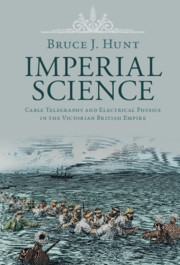Book contents
- Imperial Science
- Science in History
- Imperial Science
- Copyright page
- Contents
- Figures
- Acknowledgments
- Abbreviations
- Prologue: “An Imperial Science”
- 1 “An Ill-Understood Effect of Induction”
- 2 Wildman Whitehouse, William Thomson, and the First Atlantic Cable
- 3 Redeeming Failure
- 4 Units and Standards
- 5 The Ohm, the Speed of Light, and Maxwell’s Theory of the Electromagnetic Field
- 6 To Rule the Waves
- Epilogue Full Circle
- Bibliography
- Index
4 - Units and Standards
The Ohm Is Where the Art Is
Published online by Cambridge University Press: 11 December 2020
- Imperial Science
- Science in History
- Imperial Science
- Copyright page
- Contents
- Figures
- Acknowledgments
- Abbreviations
- Prologue: “An Imperial Science”
- 1 “An Ill-Understood Effect of Induction”
- 2 Wildman Whitehouse, William Thomson, and the First Atlantic Cable
- 3 Redeeming Failure
- 4 Units and Standards
- 5 The Ohm, the Speed of Light, and Maxwell’s Theory of the Electromagnetic Field
- 6 To Rule the Waves
- Epilogue Full Circle
- Bibliography
- Index
Summary
An agreed system of electrical units and standards was crucial to building a workable cable systemin the 1860s, as well as to advancing electrical science. Without such standards, it was almost impossible to extend accurate electrical knowledge beyond a single laboratory or testing room. Amid conflicts over competing standards and in response to rising demands from the telegraph industry, in 1861 William Thomson called on the British Association for the Advancement of Science to establish a Committee on Electrical Standards. The committee proved very influential, and its work marks one of the most important points of intersection between electrical science and technology in the mid-nineteenth century. Led by James Clerk Maxwell ,and Fleeming Jenkin, the committee determined the value of the ohm experimentally in 1862–64 and distributed standard resistance coils around the world. Standard ohms soon became a key part of quality control in the cable industry; indeed, the aim in manufacture became to make a cable that was, in effect, a chain of standard ohms strung end to end, its properties at each point known and recorded.
Keywords
- Type
- Chapter
- Information
- Imperial ScienceCable Telegraphy and Electrical Physics in the Victorian British Empire, pp. 144 - 180Publisher: Cambridge University PressPrint publication year: 2021

